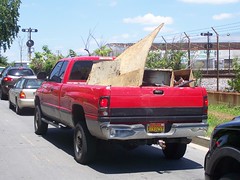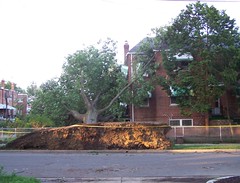Failure to have a comprehensive solid waste reduction strategy for DC seems costly
Maybe not, since DC is being paid for its solid waste, which is used as fuel for a waste to energy facility in Northern Virginia. See "D.C.'s trash is now Fairfax facility's treasured commodity" from the Washington Post.

Building materials to be dumped at the Fort Totten Waste Transfer Station.
When I ride home from Capitol Hill, I use the Metropolitan Branch Trail because it allows me to avoid the uphill climb between Michigan Avenue and Taylor Street on North Capitol--I find the climb demoralizing. Going this way takes me past the Fort Totten Waste Transfer Station (there is still a hill but it's much shorter), and I always check out the line of cars and trucks waiting to dump "trash" and much of the trash--building materials, old furniture, tree branches, etc.--seems like it could be harvested for other purposes besides a landfill. Even if Fairfax pays for the trash and burns it, it seems like it still makes more sense to reuse and recycle what can be recaptured, and overall to reduce the waste stream, especially of compostable yard waste and food waste.

Downed tree, 3rd and Oglethorpe NW, July 27th, 2010.
But when I read articles like this, say "Finding New Life (and Profit) in Doomed Trees," from the New York Times, which discusses a company in Seattle that harvests downed trees--something I've suggested be done in DC for a few years, especially after every bad storm results in so many fallen trees, and I think of the wood being landfilled rather than used.
Or seeing this piece on urban composting in the Express, "Natural Wonders In Urban Environs: Methods of Composting in the District," which reports that some guy is charging households $8/week to compost their food waste, when NYC supports the Lower East Side Ecology Center, which puts bins out at Union Square and other locations where people can deposit their food waste for composting at no charge, or when cities like Seattle added food waste (separated of course) to their "trash" pick up procedures, or how cities like Montreal have compost bins in parks and food waste is composted there.

Union Square Composting Station
Open M, W, Fri, Sat 8:30-5pm, year-round
Also, Montgomery County, Maryland has a massive yard waste reduction program which includes providing people with free composting aids--something that is harder to do for rowhouse type neighborhoods in the core of the city. But this is because the State of Maryland has requirements for local jurisdictions with regard to reduction of the waste stream.
Then again, if I could get a bunch of households in Columbia Heights to pay me $8/week to compost their food waste, maybe I ought to go into that business myself. You only need three bins in order to do serious high-speed composting.
Compost bins in a pocket park at Rue Montcalm and Blvd. Rene Levesque in Montreal





0 Comments:
Post a Comment
<< Home